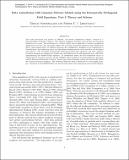Data Assimilation with Gaussian Mixture Models using the Dynamically Orthogonal Field Equations. Part I. Theory and Scheme
Author(s)
Sondergaard, Thomas; Lermusiaux, Pierre F. J.
DownloadLermusiaux_Data Assimilation I.pdf (1.462Mb)
OPEN_ACCESS_POLICY
Open Access Policy
Creative Commons Attribution-Noncommercial-Share Alike
Terms of use
Metadata
Show full item recordAbstract
This work introduces and derives an efficient, data-driven assimilation scheme, focused on a time-dependent stochastic subspace, that respects nonlinear dynamics and captures non-Gaussian statistics as it occurs. The motivation is to obtain a filter that is applicable to realistic geophysical applications but that also rigorously utilizes the governing dynamical equations with information theory and learning theory for efficient Bayesian data assimilation. Building on the foundations of classical filters, the underlying theory and algorithmic implementation of the new filter are developed and derived. The stochastic Dynamically Orthogonal (DO) field equations and their adaptive stochastic subspace are employed to predict prior probabilities for the full dynamical state, effectively approximating the Fokker-Planck equation. At assimilation times, the DO realizations are fit to semiparametric Gaussian mixture models (GMMs) using the Expectation-Maximization algorithm and the Bayesian Information Criterion. Bayes’ Law is then efficiently carried out analytically within the evolving stochastic subspace. The resulting GMM-DO filter is illustrated in a very simple example. Variations of the GMM-DO filter are also provided along with comparisons with related schemes.
Date issued
2012Department
Massachusetts Institute of Technology. Department of Mechanical EngineeringJournal
Monthly Weather Review
Publisher
American Meteorological Society
Citation
Sondergaard, Thomas, and Pierre F. J. Lermusiaux. “Data Assimilation with Gaussian Mixture Models Using the Dynamically Orthogonal Field Equations. Part I: Theory and Scheme.” Monthly Weather Review (2012): 121011101334009.
Version: Author's final manuscript
ISSN
0027-0644
1520-0493